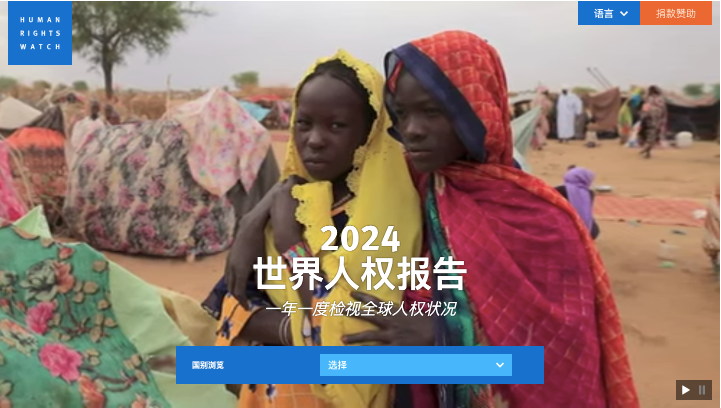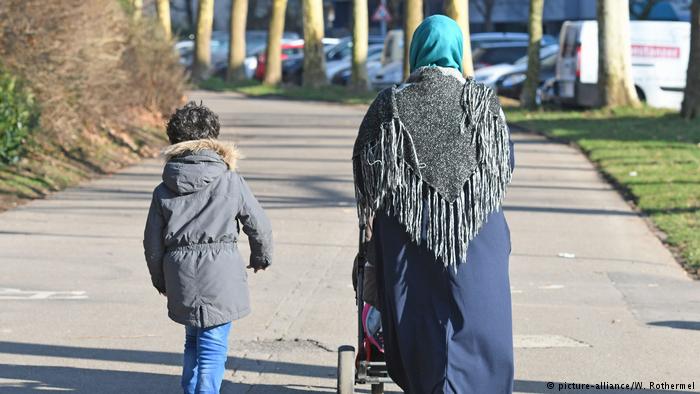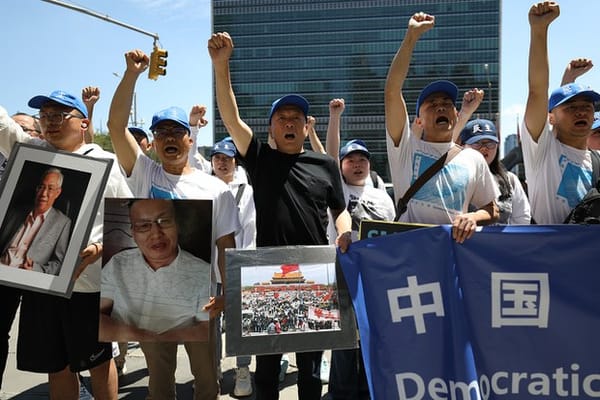Human Rights Watch: The Chinese government’s targets for political repression continue to increase

The non-governmental organization Human Rights Watch released the "2024 World Human Rights Report" on the 11th, pointing out that "the global human rights crisis has worsened, and leaders of various countries have stood aside and watched", and specifically mentioned that the human rights situation in Asia, including China, will not improve in 2023. Years of deterioration.
Specifically, non-democratic countries such as China, the Philippines, Cambodia, Myanmar, and North Korea continue to intensify their destruction of human rights. However, Human Rights Watch criticized that as representatives of democratic countries, Japan, South Korea, and India did not stand up to advocate human rights. Instead, they chose To remain silent.
In terms of human rights in China, the report criticized, "In 2023, more than ten years after President Xi Jinping took power, the Chinese government's repression and social control have intensified." Among them, the only improvement is that "in order to attract foreign investment during the economic downturn, the Chinese government seems to have slightly restrained its rhetoric towards Western countries." However, the report also mentioned that small-scale resistance began to appear in China in 2023. "More and more people began to take great personal risks to openly question the direction of the country under Xi Jinping's leadership."
The report first points out that an important event for human rights in China in 2023 will be "the Chinese government's sudden halt to its harsh 'COVID-19 Clearance' policy." "Because most people and medical institutions are unprepared, the number of new coronavirus infections, hospitalizations, and deaths has increased dramatically." Human Rights Watch cited data from American academic institutions and pointed out that the number of "excess deaths" caused by this policy may be as high as 1.87 million. However, "with strict censorship of speech, the true death toll may never be known."
Secondly, China’s most serious human rights crisis remains that “the Chinese government continues to implement brutal policies against Uyghurs and other Turkic Muslims in Xinjiang. These policies are enough to constitute crimes against humanity.” In Tibet and Xinjiang, as long as you contact relatives and friends overseas or promote local Culture, language and religion may be regarded as "separatists" and sentenced to severe penalties.
In addition, "the targets of political suppression by the Chinese government continue to increase. With the revision of the Counterespionage Law in July, the Ministry of National Security encourages reporting of suspected spies, and even foreign employees living in major cities in China are at risk."
However, in 2023, there were many small-scale popular protests in China due to the economic downturn. These protests are often related to citizens' own economic interests, such as social security, pensions, labor disputes, etc. The report also mentioned protests such as “Retirees in February opposed the reduction in the amount of medical insurance subsidies.”
Finally, the report states, “The desire to promote social justice continues to surge within many people, especially those who face injustice, such as women and LGBT (lesbian, gay, bisexual and transgender) people. , Tibetans, Uyghurs, Hong Kongers and the socio-economically disadvantaged population. Some exiles have coalesced into overseas advocacy movements.”
2. The story of overseas Chinese workers: leaving their hometowns and being oppressed
China Labor Watch, a non-profit organization, has published numerous investigative reports on Chinese workers abroad. On the 11th, they recorded and published the experiences of 10 overseas workers, telling the unknown and tragic stories behind them.
In this collection of stories, “these workers had diverse backgrounds and skills and were sent to various countries, including Indonesia, Serbia, Cambodia, Turkey, and the Democratic Republic of Congo,” yet their common experience was that “ Abuse and Exploitation by Chinese Employers Abroad” and resistance to these unfair encounters.
The story documents "a range of specific experiences of abuse, including deception, arbitrary manipulation of wages, restrictions on freedoms, threats and violence, poor living and working conditions, poor security, lack of health protection and confiscation of passports," among others. Particularly during the COVID-19 pandemic, China-related travel restrictions and quarantine requirements have provided many Chinese employers with an excuse to further abuse their power by restricting workers’ movements, keeping them abroad for longer than their contract terms, and so on.
In the second story, Mr. Chen, an electrician, came to work in the African country Congo (DRC) in 2021. However, he soon discovered that he was on a tourist visa rather than a work visa. Not only that, his passport was also confiscated, and he had to endure up to 12 hours of work every day. Moreover, the work content is not the ordinary electrician signed on the contract, but dangerous work that requires handling high-voltage electricity.
In terms of accommodation, the local employee dormitories are located between a sulfuric acid pool and a kerosene pool. The dormitories are locked with iron chains to prevent workers from escaping. In addition, the company does not provide dinner, and most workers only choose to eat two meals to save money. However, because Mr. Chen worked the night shift, he needed to have dinner every night before work. However, he soon discovered that dinner was expensive. If he had to maintain three meals a day, he would have very little salary left.
When his complaints failed and he couldn't bear it anymore, Mr. Chen chose to run away. Recalling this experience, he said, "It was more terrifying than death. There was no electricity, so I had to go to the wild to find food during the day. There were some wild tomatoes and some small bananas that were about to ripen." In this way, Mr. Chen was in a building After wandering in the mountains and forests for a few days, he was finally helped by local kind-hearted people and got in touch with the outside world. At the end of the story, fearing retaliation, Mr. Chen fled to another African country, Nigeria, and found a formal job in a factory there.
There are many similar situations. However, Mr. Chen was lucky. After all, he escaped from a factory run by the Chinese. But the Chinese workers on the Indonesian island of Sulawesi were not so lucky. According to an investigation by the Business & Human Rights Resource Center, workers at a mining project jointly established by Jiangsu Delong Nickel Co., Ltd. and Xiamen Xiangyu Group suffered the same treatment, or even worse. However, Being on an isolated island, workers have nowhere to escape. At least three workers committed suicide as a result, and workers who wanted to leave were required to pay 70,000 yuan to the factory to gain freedom.
However, China Labor Watch also stated that there is a positive side to the life of overseas Chinese workers. “Struggles and abuses do not define individual Chinese workers. In some stories, workers emerge as sparks of hope and joy amid the ruthlessness of daily life.” "In story nine, 'Mr. Bian in Serbia,' an ordinary wage worker, Mr. Bian, faces various abuses at an outsourced property management company in Serbia. Despite being exploited...he finds joy outside of work and strives to Learn a new language and look forward to a better future.”
Finally, China Labor Watch said, “In a sense, these stories bear witness to the daily experience of the Chinese working class living and struggling in a world that is indifferent to their struggles. Some people, despite their hardships, have discovered the beauty of the world. Beautiful. Yet others find their jobs exploitative and endless. However, their daily struggles point to a larger issue of labor exploitation and systemic inequality."
3. Freedom House calls on governments to care for Uyghurs in exile overseas
Freedom House issued an article on the 11th, calling on governments around the world to provide help to overseas Uyghurs. “Members of the Uyghur ethnic group have long faced repression by the Chinese authorities. As the Chinese government exerts more pressure on the Uyghurs, at home, By abusing them and intimidating them abroad, host countries should step up to protect them."
Currently, there are at least more than 500,000 Uyghurs living in 38 countries around the world. Among them, the largest and oldest community is in a country geographically and culturally close to its historical homeland - Kazakhstan. There are nearly 300,000 Uyghurs here, while neighboring Uzbekistan and Kyrgyzstan each have more than 50,000 Uyghurs. Türkiye, which is also a Turkic nation, also has at least 50,000 Uyghurs. In addition, there are 15,000 people living in Europe, 10,000 people in the United States, 3,000 people in Australia, and more than 2,500 people in Canada.
The article pointed out that there were three waves of Uyghur immigration, with the first wave occurring at the end of the 19th century. The second began with the founding of the Communist Party of China in 1949, and immigration continued until the late 1960s as the new regime imposed restrictions on Uyghur cultural practices and with the advent of the Cultural Revolution. The most recent wave began in the 1990s and lasted until late 2016. Later, Chinese authorities began confiscating Uyghur passports and committing atrocities, ending this wave of immigration.
“Since 2016, news of appalling human rights violations have emerged in China’s Xinjiang region. In this land, home to Uyghurs and other Turkic ethnic groups, the Chinese government has sought to erase the unique identity of its target groups and their resistance to the Chinese Communist Party-led Loyalty to institutions outside the party state...includes mass surveillance, forced labor, concentration camp internment, family separation and forced sterilization."
However, Freedom House points out that Uyghurs are not safe even overseas. For example, “In 2021, Turkish authorities arrested Uighurs arrested in connection with protests and threatened to deport them.” “Some Uyghurs fear the safety of whistleblowers or relatives living in Xinjiang and live in distrust and isolation.” Furthermore, “Uyghurs are also at risk when host countries meet China’s deportation demands, which has already been the case in Happening in multiple countries."
Freedom House said that there is a new situation recently: "Many Uyghurs who recently immigrated abroad have become stateless because they cannot renew their passports issued by China. They have difficulty accessing basic medical services or resources, and it can be said that they are most afraid of crossing borders. repression". For those Uyghurs who have personally experienced the atrocities in Xinjiang or suffered secondary trauma, their mental health is even more difficult. “Local Uyghur organizations often lack the expertise to address these issues, which are also harder to acknowledge because they are considered taboo.”

Uighurs who were previously denied asylum in Germany are now allowed to stay in Germany
Freedom House therefore calls on governments to take steps to help the Uyghurs. “The United States, the United Kingdom, and Canada have taken meaningful action to address the issue of Uyghur forced labor through legislation.” "Some countries have funded Uyghur-run advocacy groups working to effect change from abroad in the Uyghur homeland. Relevant governments should continue to provide this support, even though they cannot unilaterally fight back against the abuses faced by Uyghurs in Xinjiang."
Additionally, “through diplomatic channels and advocacy, international institutions and civil society can pressure Beijing to cease its repressive policies and encourage host countries to respect their Uyghur residents.”
Finally, Beijing systematically uses torture against members of so-called “illegal” religious groups, political opponents, and criminal suspects. "Governments should exercise extreme caution when considering deportation requests from Beijing and comply only if they are certain that individuals are not politically targeted and will not face torture. Interpol, for its part, should avoid disseminating notices initiated by Beijing."



